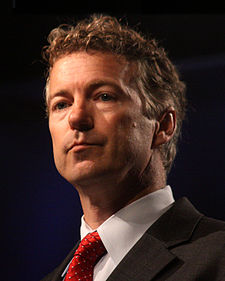Republican leaders draft bill to eliminate EPA climate change rules


Citing cost, House Republicans are drafting legislation that would amend the Clean Air Act to strip the Environmental Protection Agency of its authority to regulate greenhouse gases.
Michigan Rep. Fred Upton, chairman of the House Energy and Commerce Committee, and Rep. Ed Whitfield (R-Ky.), chairman of the subcommittee on energy and power, today unveiled draft legislation that is tentatively called the “Energy Tax Prevention Act.”
Upton and Whitfield told the press that the Clean Air Act was never intended to address climate change, and accused the EPA of planning to impose a “backdoor cap-and-trade tax” that could harm American businesses, they said. The draft is available online.
Tea party activist Sen. Rand Paul (R-KY) incited populist anger against the EPA prior to his successful election in November, with statements such as: "'Their agenda is not pollution, it's capitalism,' and 'These people do not like our way of life.'" Paul promised to "rein in the EPA" if elected.
The Whitehouse has vowed that it will veto any legislation that blocks the EPA’s climate change rules, which the agency began to phase in this January. The EPA has been tepid in implementing its rules, granting biomass energy facilities a temporary reprieve last month.
"These efforts would halt EPA's common-sense steps under the Clean Air Act to protect Americans from harmful air pollution that, until now, has not been subject to any pollution standards," Brendan Gilfillan, an EPA spokesman, said during a press conference.
Gilfillan stated that the rules would compel businesses to invest more in clean energy technologies, thus creating “green” jobs. EPA administrator Lisa Jackson held a press conference to reiterate how the agency already regulates carbon emissions from automobiles and other large sources, and “the economy is fine.”
Some public interest groups also oppose any effort to block EPA climate rules from going into effect. The American Lung Association issued a statement saying that repealing the rules would lead to a rise in healthcare costs associated with respiratory diseases.
While the Federal government is mired in disagreement, 23 states have begun to implement some form of Cap and Trade at the local level.
Cap and trade is a strategy for reducing climate change that was originally proposed by free-market conservatives during the Reagan administration; many Republican Party leaders are now vehemently opposed to it and reject climate change science.
Rep. Upton, however, has affirmed his belief in climate change, but opposed climate change legislation passed during the previous Congress in 2009, alleging that it would harm the economy. Upton favors an energy mix including nuclear power and wind, according to the Washington Post.
The EPA is obligated to act to regulate CO2 and other greenhouse gas emissions due to the U.S. Supreme Court’s 2007 ruling in the case Massachusetts v. EPA, which classified carbon dioxide as a pollutant.
Massachusetts v. EPA was filed by a coalition of 12 states, and some local governments, sued to force a reluctant Bush era EPA to regulate greenhouse gasses from automobile exhaust. The state of Arizona's attorney general recently abandoned the case.
The Clean Air Act was amended in 1990 during the presidency of George H. Bush to address Ozone depletion and new standards to fuel economy in motor vehicles. The amendment introduced an emissions trading system aimed at reducing acid rain pollutants from power plants, otherwise known as Cap and Trade.
This post was originally published on Smartplanet.com